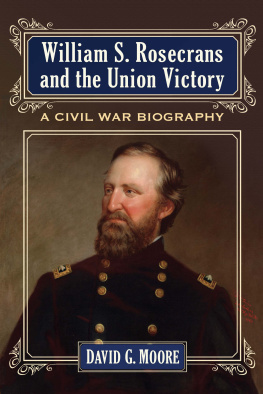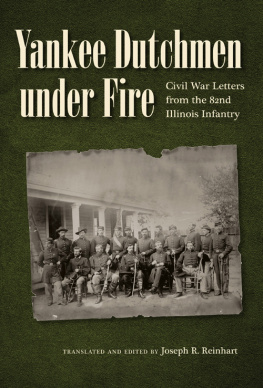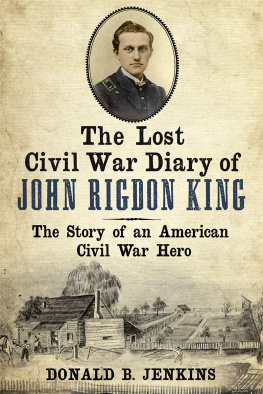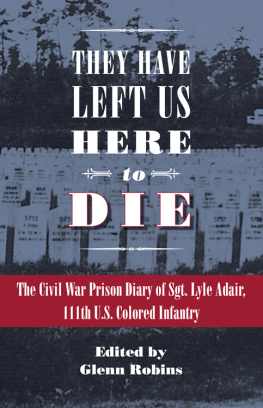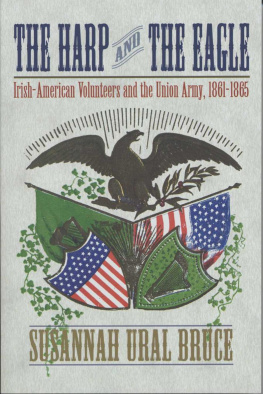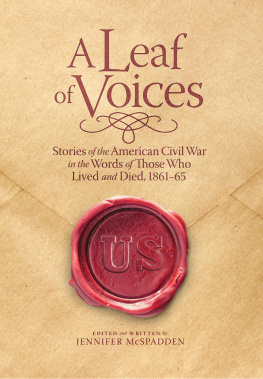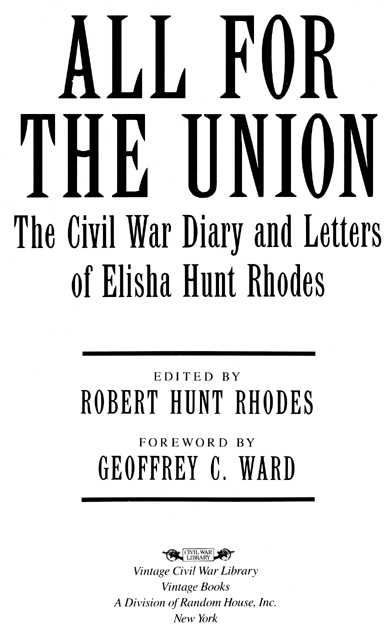Elisha Hunt Rhodes was born in Providence, Rhode Island, in 1842. He enlisted as a Union Army private in 1861 and went on to fight in battles from Bull Run to Appomattox. Rhodes illustrative diary of his service in the Civil War was quoted in Ken Burns PBS series The Civil War.
ROBERT HUNT RHODES
Robert Hunt Rhodes was born in Providence, Rhode Island, in 1937, as one of six great-grandchildren of Elisha Hunt Rhodes. He graduated from the University of Rhode Island and had an MS degree from Simmons College Graduate School of Library Science. He has served in both the Rhode Island and Vermont National Guards.
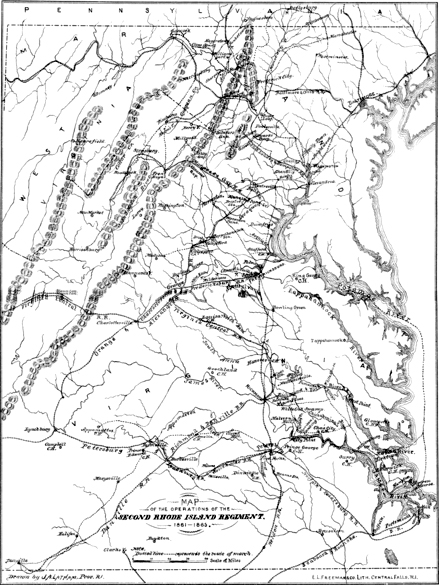
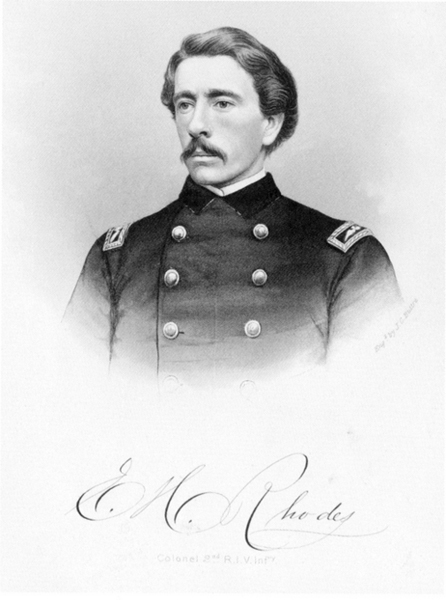
FIRST VINTAGE CIVIL WAR LIBRARY EDITION, JULY 1992
Copyright 1985 by Robert Hunt Rhodes
Foreword copyright 1991 by Geoffrey C. Ward
All rights reserved under International and Pan-American Copyright Conventions. Published in the United States by Vintage Books, a division of Random House, Inc., New York, and simultaneously in Canada by Random House of Canada Limited, Toronto. Originally published by Andrew Mowbray Incorporated in 1985. This edition containing the foreword first published by Orion Books, a division of Crown Publishers, Inc.
Library of Congress Cataloging-in-Publication Data
Rhodes, Elisha Hunt, 18421917.
All for the Union: the Civil War diary and letters of Elisha Hunt Rhodes / edited by Robert Hunt Rhodes; foreword by Geoffrey C. Ward. 1st Vintage ed.
p. cm. (Vintage Civil War library)
Originally published: Lincoln, RI: A. Mowbray, c1985.
eISBN: 978-0-307-77270-1
1. Rhodes, Elisha Hunt, 1842-1917Diaries. 2. Rhodes, Elisha Hunt, 1842-1917Correspondence. 3. United States. Army. Rhode Island Infrantry Regiment, 2nd (1861-1865)Biography. 4. Rhode Island HistoryCivil War, 1861-1865Personal narratives. 5. United States HistoryCivil War, 1861-1865Personal narratives. 6. Soldiers Rhode IslandDiaries. 7 SoldiersRhode Island Correspondence. I. Rhodes, Robert Hunt, 1937
II. Title. III. Series.
[E528.5 2nd.R46 1992]
973.7:445dc20 91-50734
v3.1
To Landmark Colleges students and alumni
who are engaged in a battle
against dyslexia
CONTENTS
1861
Raising the Regiment Camp Brightwood, Md.
1862
Washington D. C. Fredericksburg, Va.
1863
Falmouth, Va. Camp Sedgwick, Va.
1864
Brandy Station, Va. Petersburg, Va.
1865
Petersburg, Va. Providence, R.I.
EPILOGUE
Frederick Miller Rhodes, Jr. Remembers His Grandfather
FOREWORD
One March day in 1862, General George B. McClellan, never averse to a little favorable publicity, granted passes to a small party of influential civilians that included Nathaniel Hawthorne and a British correspondent, Edward Dicey of The Spectator, to travel out from Washington into Virginia and report firsthand on his elaborate preparations for the peninsula campaign. Hawthorne, Dicey, and their companions were suitably dazzled by the miles of supply wagons, the busy fleet of transports that clogged the Potomac, the wharves and river-steamers crowded with eager, cheering men in blue. It seemed to Dicey impossible that such an army would not sweep all before it.
Toward evening, the little party headed back toward town, only to be halted on the Virginia side of the long chain bridge across the Potomac. For hours we found it impossible to cross, Dicey wrote, as a division of 16,000 men were marching over. With colors flying and bands playing, regiment after regiment defiled past us. The men were singing, shouting, cheering; they chanted John Browns Hymn, and the heavy tramp of a thousand feet beat time to that strange weird melody. As the New England regiments passed our train, they shouted to us to tell the people at home that we had seen them in Dixies Land and on the way to Richmond. Ah, me! How many, I wonder, of those who flitted before us in the twilight, came home themselves to tell their own story.
One of the New Englanders who marched across that chain bridge and did come home to tell his own story was Elisha Hunt Rhodes of the Second Rhode Island Volunteer Infantry, just a few days short of his twentieth birthday but already promoted to Sergeant Major. Over the course of the war, he would cross the Potomac at least twenty-five more times in pursuit of victory, and take part in every major campaign undertaken by the great northern army named for that river, from First Bull Run to Appomattox.
Rhodes had had to obtain his widowed mothers permission before he could join the army as a nineteen-year-old private in July of 1861. He would leave it, a little over four years later, as the colonel in command of his Regiment, a seasoned soldier at twenty-three. His account of what he lived through, lovingly compiled by his great-grandson and published here for the first time for a wide audience, is, I believe, one of the finest of the warfresh, vivid, understated, utterly free of the ornate and imitative style with which more learned veterans managed to put some distance between themselves and the ghastly sights they saw.
Rhodes had the genuine soldiers innate distrust of false heroics: at its first taste of gunfire, he faithfully reports, his Regiment immediately laid down without waiting for orders. But his pages are filled nonetheless with instances of heroism, and it is hard for a modern reader to understand how any man, enduring what Rhodes and his friends endured at Fredericksburg, Gettysburg, the Wilderness, Cold Harbor, or any one of a score of other battles, could have held on to his sanity.
No single soldier can be said to be representative of all his comrades. Armies, perhaps especially American armies, are made up of idiosyncratic individuals. But surely Elisha Hunt Rhodes can safely be said to have been speaking for most of his fellow-soldiers when, a few days before he was mustered out of the army, he looked back on his military career with understandable pride. I have been successful in my Army life, he wrote, simply because I have always been ready and willing to do my duty. I thank God that I have had an opportunity of serving my country freeing the slaves and restoring the Union.
Geoffrey C. Ward
INTRODUCTION
Elisha Hunt Rhodes, eldest son of Captain Elisha Hunt and Eliza Ann (Chace) Rhodes, was a lineal descendant of Roger Williams and was born in Pawtuxet village, Cranston, Rhode Island on March 21, 1842.
He attended schools in Pawtuxet as well as the Fountain Street Grammar School and Potter & Hammonds Commercial College in Providence. When his father, a sea captain and master of the coastal schooner Worcester, was shipwrecked and drowned on Linyards Cay, Abaco, Bahama Islands on December 10, 1858, Elisha was only sixteen and sole supporter of his family. He left school and went to work as a clerk in the office of Frederick Miller, a mill supplier, where he remained until June 5, 1861 when he enlisted as a private in Co. D, 2nd R.I. Volunteers. He remained in this regiment until it was disbanded on July 28, 1865. He participated in every campaign of the Army of the Potomac from Bull Run to Appomattox with rapid promotions up to the rank of Colonel in 1865.


